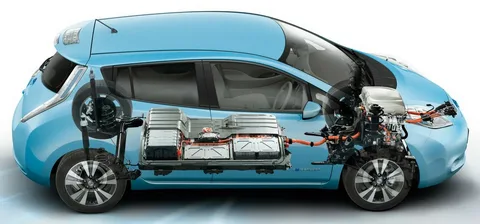
As environmental concerns and fuel efficiency become increasingly important in the automotive industry, hybrid vehicles are emerging as a critical solution for reducing emissions and fuel consumption. The global hybrid vehicles market is growing rapidly, driven by advancements in hybrid powertrains, government regulations, and the push towards sustainable mobility. Hybrid vehicles combine the benefits of traditional internal combustion engines with electric power, offering improved fuel efficiency and lower emissions across a wide range of applications.
Key Applications of Hybrid Vehicles
Hybrid vehicles are transforming various sectors, from personal transportation to commercial and industrial use, providing an eco-friendly alternative for a broad range of applications:
- Personal Transportation: Hybrid cars are gaining popularity among eco-conscious consumers. Offering fuel savings and reduced emissions, hybrids provide a practical solution for those looking to lower their carbon footprint without fully transitioning to electric vehicles.
- Commercial Fleets: Hybrid vehicles are increasingly being adopted by businesses for fleet operations, including delivery services, taxis, and public transportation. These vehicles offer long-range capabilities, reduced fuel costs, and lower emissions, making them ideal for companies focused on sustainability.
- Public Transportation: Hybrid buses are becoming common in public transportation networks, particularly in cities striving to reduce air pollution. With the ability to switch between electric and fuel power, hybrid buses provide efficient and cleaner transit solutions for urban populations.
- Logistics and Delivery Services: The logistics sector is benefiting from hybrid trucks and vans, which offer fuel efficiency and reduced operating costs over long distances. Hybrid vehicles are helping companies in this sector meet environmental regulations while optimizing performance.
- Heavy-Duty Applications: Hybrid technology is also being applied to heavier vehicles, including construction and agricultural equipment. Hybrid-powered machinery offers improved fuel efficiency, reduced emissions, and better torque for demanding tasks.
Unlock Comprehensive Insights—Read the Full Report Today!
Market Trends Driving Growth
The hybrid vehicles market is experiencing robust growth due to several key trends:
- Government Regulations and Incentives: Governments around the world are promoting the adoption of hybrid and electric vehicles through tax incentives, subsidies, and stricter emissions regulations. These policies are accelerating the transition to greener transportation options.
- Advancements in Battery Technology: The development of more efficient and cost-effective battery technologies is enhancing the performance of hybrid vehicles. With longer battery life and faster charging capabilities, hybrid vehicles are becoming a more viable option for both consumers and businesses.
- Focus on Sustainability: Consumers and businesses alike are prioritizing sustainability, and hybrid vehicles offer a practical middle ground between traditional combustion engines and full electric vehicles. This shift in mindset is contributing to the growing demand for hybrid vehicles in the global market.
- Corporate Fleet Electrification: As businesses seek to reduce their carbon footprint and comply with sustainability targets, there is an increasing push for fleet electrification. Hybrid vehicles offer the perfect solution by combining the benefits of fuel and electric power, providing flexibility and cost savings.
Leading Key Players:
The hybrid vehicles market is driven by leading key players such as Tilley Inflatable Design & Engineering Ltd., Ford Motor Company, General Motors Company, Honda Motor Co. Ltd., Daimler AG, Volkswagen AG, Renault SAS, Toyota Motor Corporation, Nissan Motor Corporation, Mitsubishi Motor Corporation, Hyundai Motor Company, and Bayerische Motoren Werke AG (BMW). These industry giants are at the forefront of innovation, investing heavily in research and development to enhance hybrid technology, improve fuel efficiency, and reduce emissions. Their competitive strategies and commitment to sustainable mobility are pivotal in shaping the future of the automotive industry.
Recent Developments Observed by FMI:
- Nissan just unveiled the fourth iteration of the X-Trail. The Nissan X-Trail is scheduled to make its debut in the middle of 2023. Strong Hybrid and Mild Hybrid hybrid drivetrains are expected to be offered for Nissan’s X-Trail SUV. The car is expected to cost around INR 40 lakhs when it goes on sale.
- The Nissan Qashqai SUV is built on the CMF-C platform, which was developed in collaboration with Renault. The Qashqai is anticipated to be powered by a 1.3L gasoline engine and a mild hybrid powertrain. The automobile is projected to cost around INR 30 lakhs when it goes on sale. Because the Qashqai is likely to go on sale after the Nissan X-Trail, we may expect to see it around late 2023 or early 2024.
Future Outlook: Bridging the Gap to Full Electrification
As hybrid technology continues to evolve, the market for hybrid vehicles is expected to grow, with an increasing emphasis on fuel efficiency, reduced emissions, and sustainability. Hybrid vehicles are seen as a critical stepping stone on the path toward full electrification, providing a versatile and eco-friendly solution for the automotive industry.
Hybrid Vehicles Market Segmentation:
By Product Type:
- Hybrid Vehicles
- Plug-in Hybrid Vehicles
By Vehicle Type:
- Passenger Car
- LCV
- HCV
By Engine Type:
- Gasoline Electric
- Diesel Electric
By Powertrain Configuration:
- Parallel Hybrid
- Series Hybrid
- Power Split Hybrid
By Region:
- North America
- Latin America
- Europe
- East Asia
- South Asia and the Pacific
- Middle East & Africa (MEA)
About Future Market Insights (FMI)
Future Market Insights, Inc. (ESOMAR certified, recipient of the Stevie Award, and a member of the Greater New York Chamber of Commerce) offers profound insights into the driving factors that are boosting demand in the market. FMI stands as the leading global provider of market intelligence, advisory services, consulting, and events for the Packaging, Food and Beverage, Consumer Technology, Healthcare, Industrial, and Chemicals markets. With a vast team of over 400 analysts worldwide, FMI provides global, regional, and local expertise on diverse domains and industry trends across more than 110 countries.
Contact Us:
Future Market Insights Inc.
Christiana Corporate, 200 Continental Drive,
Suite 401, Newark, Delaware – 19713, USA
T: +1-845-579-5705
For Sales Enquiries: sales@futuremarketinsights.com
Website: https://www.futuremarketinsights.com
LinkedIn| Twitter| Blogs | YouTube
